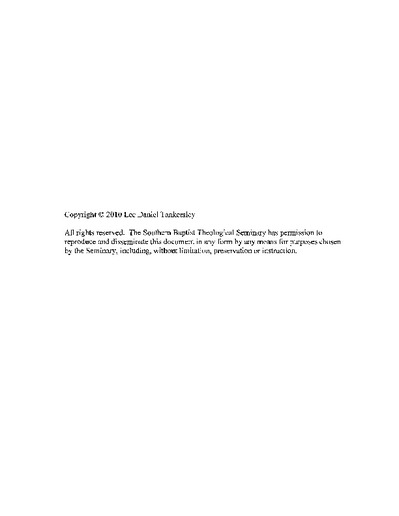The Courtroom and the Created Order: How Penal Substitution Brings about New Creation
Abstract
This dissertation argues that penal substitutionary atonement is necessary for
transformation of the created order. This assertion answers the charge that an atonement
model that deals with forensic judgments, the moment of justification, and a focus on the
individual serves as an obstacle to God's purpose of restoring even the created order
itself.
Chapter 1 examines the current setting of the debate, illustrating the need for
this charge to be answered. This chapter also lays out the thesis as well as the
methodology of the dissertation.
Chapter 2 asks the question, "What is wrong with the created order?" This
chapter demonstrates that the plight of creation is that it is held in bondage to a reign of
death which is itself a manifestation of the legal verdict of condemnation that has come to
individuals in Adam.
Chapter 3 demonstrates that the reason numerous evangelicals deny penal
substitution is because of a faulty understanding of the nature of God. This chapter
argues that God's righteousness is broader than covenant faithfulness, that it includes an
element of retribution, that it is intrinsic to God, and that God's wrath includes his
personal inflicting of punishment upon the sinner. After examining God's nature, this
chapter ends by noting the necessity and difficulty of removing condemnation from
individuals.
Chapter 4 illustrates how penal substitutionary atonement accounts for the
removal of condemnation from individuals in a manner that is in accord with God's
righteousness. This chapter also shows the biblical support for penal substitution through
an examination of Romans 3:25-26; 8:3; 2 Corinthians 5:21; and Galatians 3:13.
Chapter 5 demonstrates that far from making the resurrection of Christ
unnecessary, penal substitution demands the resurrection because Christ dies as the
condemned one on behalf of sinners. The reason the resurrection is necessary, then, is
because it serves as and manifests Christ's justification. Furthermore, because Christ's
resurrection serves as his legal justification and appointment as son as well as an
eschatological demonstration of these legal realities, so believers legal verdict of
justification and adoption as sons necessitates a demonstration of these realities in their
resurrection, wherein they will be revealed as God's sons. At this time, the created order
will be restored.
Chapter 6 summarizes the argument of the first five chapters, notes an area of
possibility for further study, and provides a brief note of conclusion. This chapter
concludes that far from obscuring God's cosomological purposes, penal substitution is
required for the redemption of the created order.

